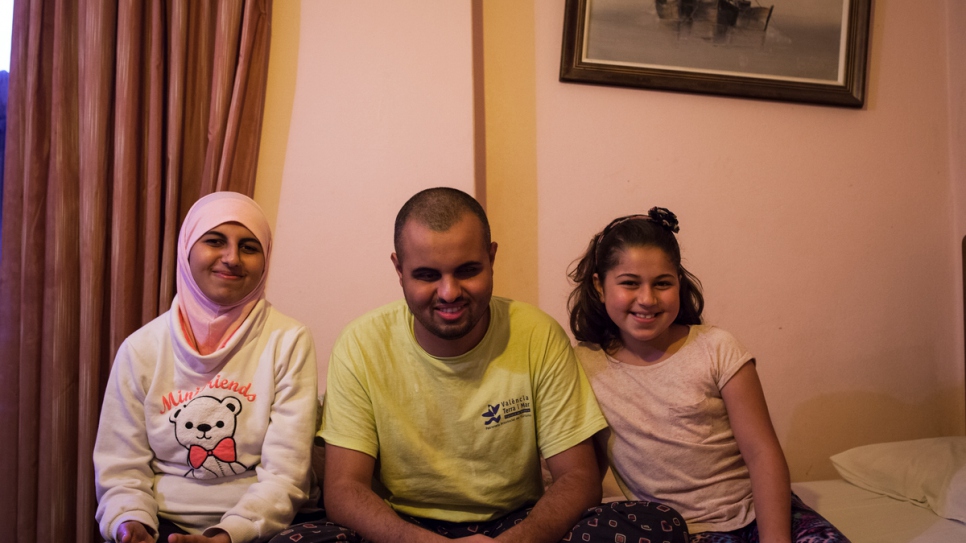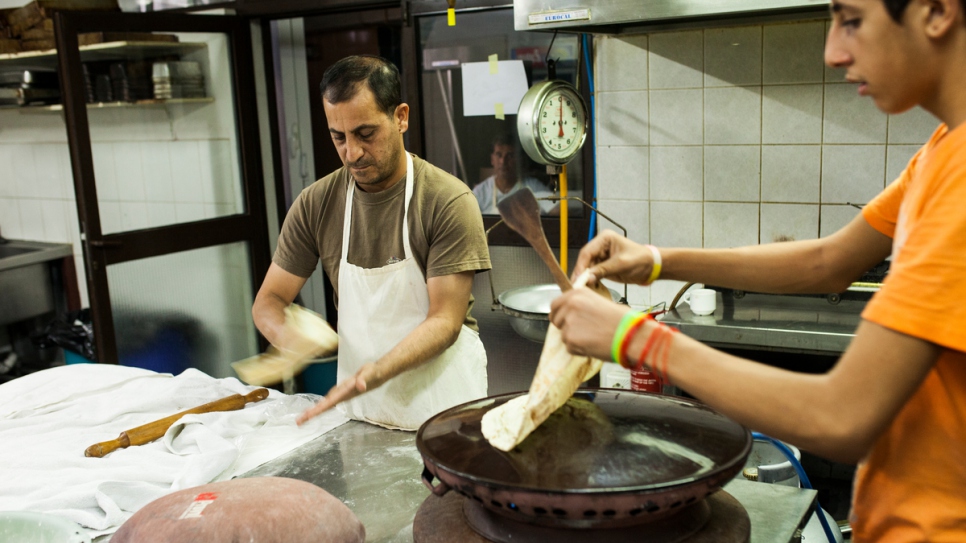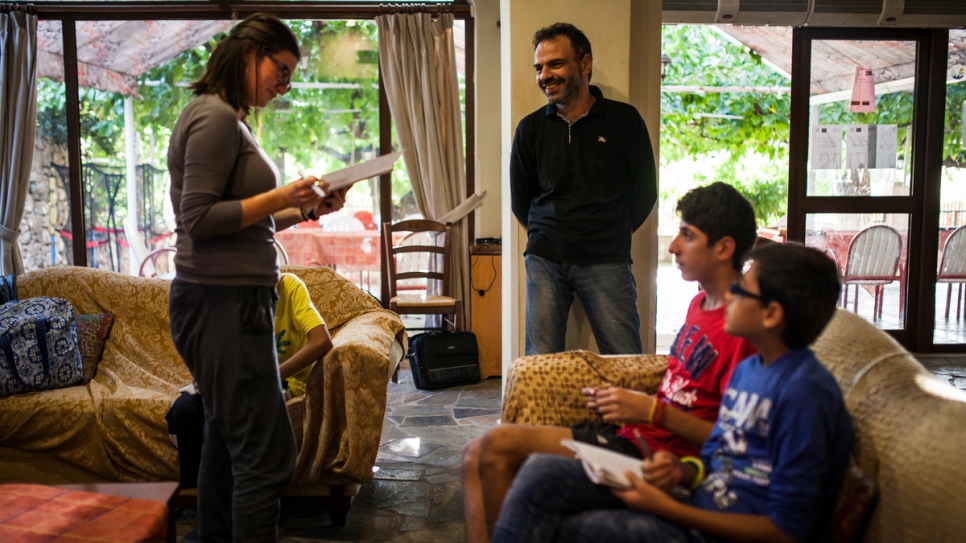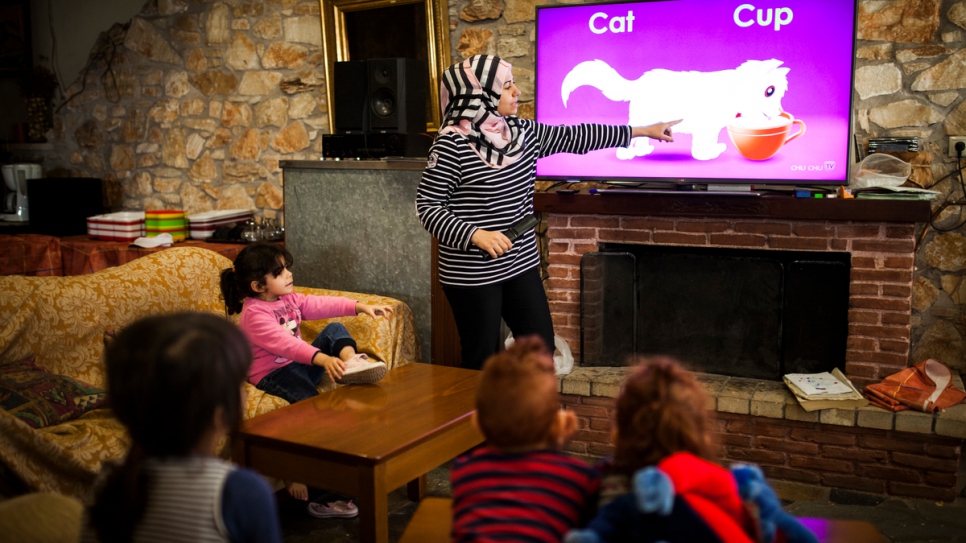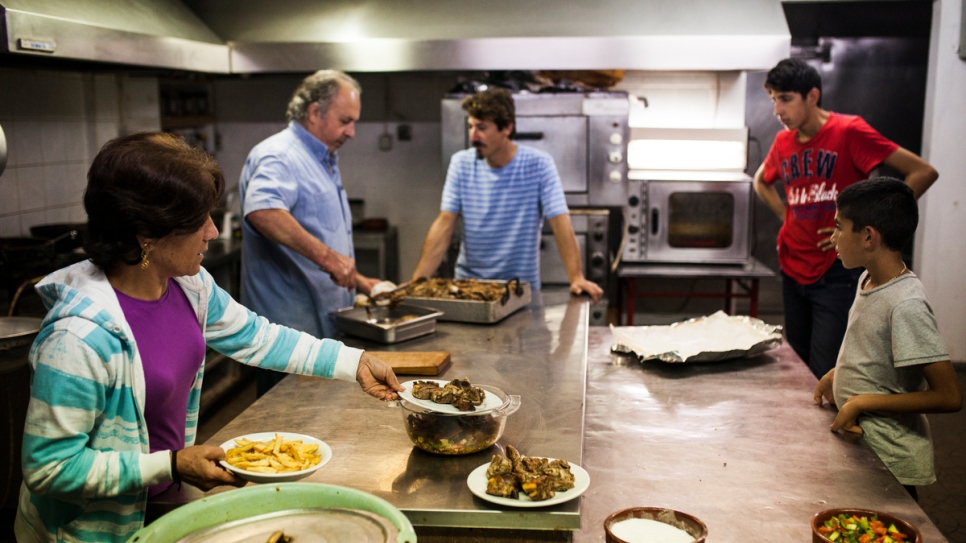Refugee families find a ray of hope at Greek hotel
Greek businessman Andreas Vasileiou has found space in his hotel and his heart for families seeking refuge from war at home.
A Syrian refugee talks on his mobile phone in the courtyard of the Rovies Hotel.
© UNHCR/Achilleas Zavallis
For months, hotelier Andreas Vasileiou felt helpless as he watched the news of refugees living in dire conditions across Greece. He wanted to offer them something better, a place where they would feel welcome. So this spring, his family-run, seaside hotel on Greece's second-largest island of Evia changed its clientele.
Vasileiou responded to a call by UNHCR, the UN Refugee Agency, for Greek hotels to host refugees as part of an accommodation programme funded by the European Commission. His hotel has become a temporary home for up to 88 asylum-seekers from Syria, Iraq, Eritrea and other countries. About half of them are children.
The hotel is not just a place to sleep. Vasileiou has gone the extra mile. He's created a collective environment where refugees, hotel staff and locals in nearby Rovies village can eat, work and live all together – and learn from each other. At Hotel Rovies, instructors hired through the accommodation programme teach refugees theatre skills and swimming at the beach just outside. Refugee women cook their traditional meals in the bustling collective kitchen, while the reception-area TV blares Arabic channels. Children attend classes in German, English and French, taught by Greek teachers as well as fellow refugees. The community they have built is an example of solidarity in action.
"We live all together in the hotel," Vasileiou says. "I sleep in one room. And the staff from Athens sleeps in another. Their doors are literally always open. We make them feel that this is their home and that they are part of a family."
"We make them feel that this is their home and that they are part of a family.”
Ten-year-old Salam, from outside Damascus, shares a room at Hotel Rovies with her two older siblings. She has, by default, become their carer: her brother, 24-year-old Ashraf, is partially blind, while her sister, 22-year-old Ghufran, has developmental disabilities. They are among many vulnerable cases staying at the hotel after being referred there from other refugee reception sites in Greece.
"It's not home, but it's the closest we could have right now," Salam says.
The accommodation programme is part of the EU's relocation scheme, which aims to relocate 66,400 asylum-seekers from Greece to other European countries through September 2017. Most refugees staying in Hotel Rovies are among those who could find new homes elsewhere in Europe. Several have already left for France, Spain, Switzerland, Romania and the Netherlands.
Others, like Salam and her siblings, have a legal right to family reunion under the EU's Dublin Regulation. Her mother and 19-year-old brother are refugees in Sweden. Both avenues – relocation and family reunion – come with lengthy wait times of up to a year, and sometimes longer. In a visit to Greece in August, UN High Commissioner for Refugees Filippo Grandi urged EU countries to speed up these procedures to ease pressure on Greece, where many of the country's 50,000-plus refugees and migrants live in overcrowded, inadequate reception sites.
The UNHCR accommodation programme has facilitated 18,200 stays for asylum-seekers in apartments, hotels or with host families. Through partners, the agency provides them with assistance such as food, hygiene items, interpretation, medical help and legal aid.
At Hotel Rovies, SolidarityNow, a Greek non-profit, oversees the refugees' day-to-day care.
"Here, everyone has their role," says SolidarityNow's local coordinator, Antonis Grigorakos Tzivakos. "We are a team."
Refugees staying at Hotel Rovies also get involved with the local community. In June, at the end of Ramadan, they set up a stand to give away Syrian food to local residents. Refugee children also painted a mural on the wall of the school in Rovies village.
Initially, Rovies residents were concerned about a possible backlash over the refugees' presence, creating an anti-racist committee to promote peaceful coexistence. But they needn't have worried: locals often stop by at the hotel to say hello, share food they've cooked or drop off donations.
"Here, everyone has their role. We are a team."
Seeing the success of Hotel Rovies' inclusive, collective approach, several other Greek hoteliers have also enquired about joining the refugee accommodation programme.
Thirty-five-year-old Manar, a Syrian mother of three living in the hotel, sends her children to the local school alongside Greek children. They are learning Greek and making friends.
Manar herself volunteers as an English teacher at the hotel, leading three classes a day of one hour each. Many of her pupils are far behind in their education after years of war prevented them from attending school.
"When they first arrive at the hotel, many of the kids are lost and can't behave after everything they've been through," says Manar, whose family endured a traumatic escape from Syria and arrived on the Greek island of Samos in February. "Class gives them a routine and something to do. They calm down and start learning again."
Refugees at the hotel are eager to leave for their new countries. But that day is often bittersweet when it finally comes.
"We cry a lot," Vasileiou says. "The bonds between the refugees, the staff and the villagers are very strong. They all promise to come back."
Vasileiou has a recurring daydream in which, 50 years from now, an elderly Syrian or Iraqi woman on a beach in the EU is teaching her grandchild how to swim.
"I'd like to think that in that moment, she’ll think back to where she was when she learned how to swim," Vasileiou says. "That after fleeing war, horrible living conditions, camps, mud and cement, she found herself in a beautiful place, where people welcomed her and gave her love and affection, and taught her things, like swimming. And then maybe she'll think of me as well."



